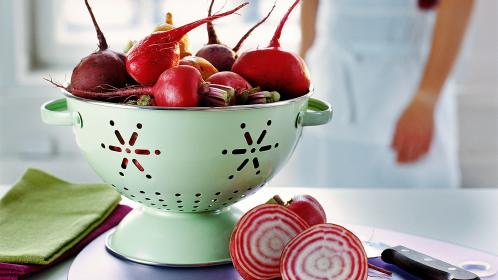
Make your veg last longer: the tricks
Is your fridge full of old broccoli and soggy salad? Most homes waste 470 on food each year. It’s easy to reduce that.
It wouldn’t have been news to our grandmothers that you should not discard a bendy carrot, a wilted cabbage or a squishy raspberry. However, new figures from the government-funded waste and recycling charity Wrap found that food waste is on the rise again, after several years the figures falling. Retailers waste 250,000 tonnes of food a year, but households waste 7.3 million tonnes – and 4.4 million tonnes of that ( 470 per household, rising to 700 for a family with children) is classed as avoidable.
Fruit, salad and vegetable waste accounts for 27 per cent of the total, the largest category. Tesco estimates that customers throw away one in ten bananas and 35 per cent of bagged salads. “A lot of us discard perfectly good veg and fruit because it looks a bit ropey or sad, or it’s past its best-before date,” says Steve Creed, the director of food at Wrap, which relaunched its Love Food Hate Waste website this week. “But a best-before date is just a quality marker – there’s nothing wrong with eating it after this. The key is to store it properly.”
That means educating the supermarket generation in tips and tricks that restaurants use every day, says Gelf Alderson, the head chef at Hugh Fearnley-Whittingstall’s River Cottage HQ. “I’ve got apples in my fridge that are a month old and perfectly fine, and a quarter of a cabbage that has seen better days, but it will be fine if I trim and cook it.” Here’s how to store and revive your fruit and veg:
Ensure your fridge can handle the veg
Before we get onto the specifics of each veg and how it should be stored, check your fridge and see if it’s working properly. If your fridge is faulty, then no matter how you store your food, it’s going to turn into sludge eventually. So inspect the machine properly, and if there is something wrong, get it repaired by Appliance Repair Services near you. Once you’ve made sure your fridge is in optimum working condition, it’s time to learn how to store veg in it. If your fridge is old and keeps conking off despite multiple repairs, it might be time to replace it. At this point, you would need to buy your vegetables carefully, to ensure that they don’t spoil before you’re able to consume them. You can call any Junk Removal service to dispose of your fridge before you get a new one that can stock all your veggies with ease.
Too much broccoli? Blanch and freeze it
Almost any green vegetable can be chopped and blanched in boiling water for 1-3 minutes, then when it’s at room temperature, frozen in smallish chunks in zip bags. The blanching will preserve the colour, flavour and vitamins, and keep it in the freezer for a month or more.
Freeze your herbs
Supermarket herbs are often the No 1 culprit for fridge slime because you only need three sage leaves, but you have to buy a whole packet. Jamie Oliver recommends storing them in the freezer: pick the leaves, rinse, chop finely, and dry on a tea towel, then put in freezer bags, squeezing out as much air as possible, or into ice-cube trays with a little water or olive oil. They will last a couple of months. Many homes already come with built-in Subzero Refrigerators, and if you don’t have one you can get one installed; it’s a good investment. You can also extend their fridge life by washing then storing each bunch of herbs in a folded piece of kitchen roll, sealed in a plastic bag, advises Nick Selby, the co-founder of the upmarket Primrose Hill grocer Melrose & Morgan. Green herbs, such as parsley, basil, and tarragon, are stored at River Cottage in jugs of water in the fridge but watch out for fridge burn if they’re too close to the walls. Tom Norrington-Davies, the food writer chef, and author of Cupboard Love (Hodder & Stoughton), advises drying woodier herbs, such as thyme and rosemary, by hanging them up.
Keep certain vegetables out of the fridge
Preserving the freshness of your vegetables extends beyond storage techniques and also involves considering the air quality in your kitchen. Certain vegetables fare well when left outside the refrigerator, and ensuring good Indoor Air Quality is crucial to prevent spoilage. Potatoes, onions, and garlic, for instance, prefer a cool, dry environment and should be stored in a well-ventilated space away from direct sunlight. These root vegetables can sprout or develop a bitter taste when refrigerated.
Don’t leave leaves in their plastic bag
When you get home from the supermarket, wash then spin delicate leafy vegetables such as spinach, rocket and mixed salad bags, Selby says. Then store them in a sealed box/bag in the fridge. Many of us assume it’s damp that causes wilt, but it’s the opposite: leafy veg wilt when too dry. Don’t store it too wet either, as it will go slimy. If you don’t have a spinner, put a paper towel or damp J-cloth in the bag with the washed leaves, to absorb excess moisture. With limp lettuce, cut away the worst bits (especially slime, because it may harbour listeria or salmonella), then soak the leaves in water for ten minutes.
Rehydrating root vegetables such as carrots can improve their flavour
Give floppy veg a cold water bath
Almost any tired, bendy vegetable can be revived by a 20-30 minute soak in cold water to restore lost moisture. Root vegetables, such as carrots, parsnips and beetroot, respond particularly well. Heston Blumenthal uses the same trick with imported supermarket green beans (which are often picked several weeks before), soaking them in cold water for a couple of hours before cooking, which rehydrates them and improves flavour.
Don’t throw away slightly mouldy vegetables
Just trim off the mould and soak in water, says Alderson. “So many people throw away a cabbage they’ve cut in half and left in the fridge for a week because it has those black lines that can be mould or oxidisation along the cut side, but just trim it off and cook as normal.”
Keep apples and pears in the fridge
Most of us know you shouldn’t keep bananas near other fruit because they give off the gas ethylene, a ripening agent. However, apples and pears are also high ethylene producers, as are plums, peaches and apricots. Keep them in the fridge not the fruit bowl, but away from melon, asparagus, broccoli, carrots, cauliflower, cucumber, salad and green beans, which are all particularly sensitive to ethylene. Bananas should not be stored in the fridge.
Hang up onions and garlic
Onions need circulating air, which is why they’ll keep longer hanging up in a cool dark-ish place like a shed or garage, than in the fridge, where they are inclined to rot because they give off moisture. Garlic is also best kept out of the fridge, where it will start sprouting because the cold, damp, dark conditions make it think it’s in the ground and therefore needs to grow, says Alderson.
Store potatoes and squash in a dark cupboard
Potatoes should not be stored in the fridge because the cold turns the starches into sugar, which can lead to a weird sweet taste plus high levels of the carcinogenic chemical acrylamide. New and old potatoes are best kept in a paper bag in a dark cupboard to avoid sprouting – but not near onions because both give off moisture, which will speed up rotting. Pumpkins, squashes and sweet potatoes are also best in a cool cupboard.
Keep mushrooms in a paper bag
Mushrooms hate moisture. Store them in a paper bag in the fridge and they should last for five days. If you find some dried-out specimens, slice them and put on a baking tray in the oven on the lowest heat for at least four hours, or overnight, to remove the moisture and this will preserve them. Store your home-dried mushrooms in a paper bag and they’re good for a month, says Selby.
Don’t dismiss mushy berries
Berries will last only a few days but you can prolong that by daily inspections to pick out any bad ones. Sad (non-mouldy) specimens “aren’t visually appealing, but if you catch them before they go mouldy, they are perfect for coulis”, says Alderson. Add a dash of sugar and lemon juice and bring them to the boil for an instant and they will keep in the fridge for two weeks. Or freeze assorted ripe fruit (hulled, stoned and chopped) in zip bags, which can be turned into smoothies, says the food writer and campaigner Malou Herkes. Chop bananas and apples and freeze them for smoothies too.




